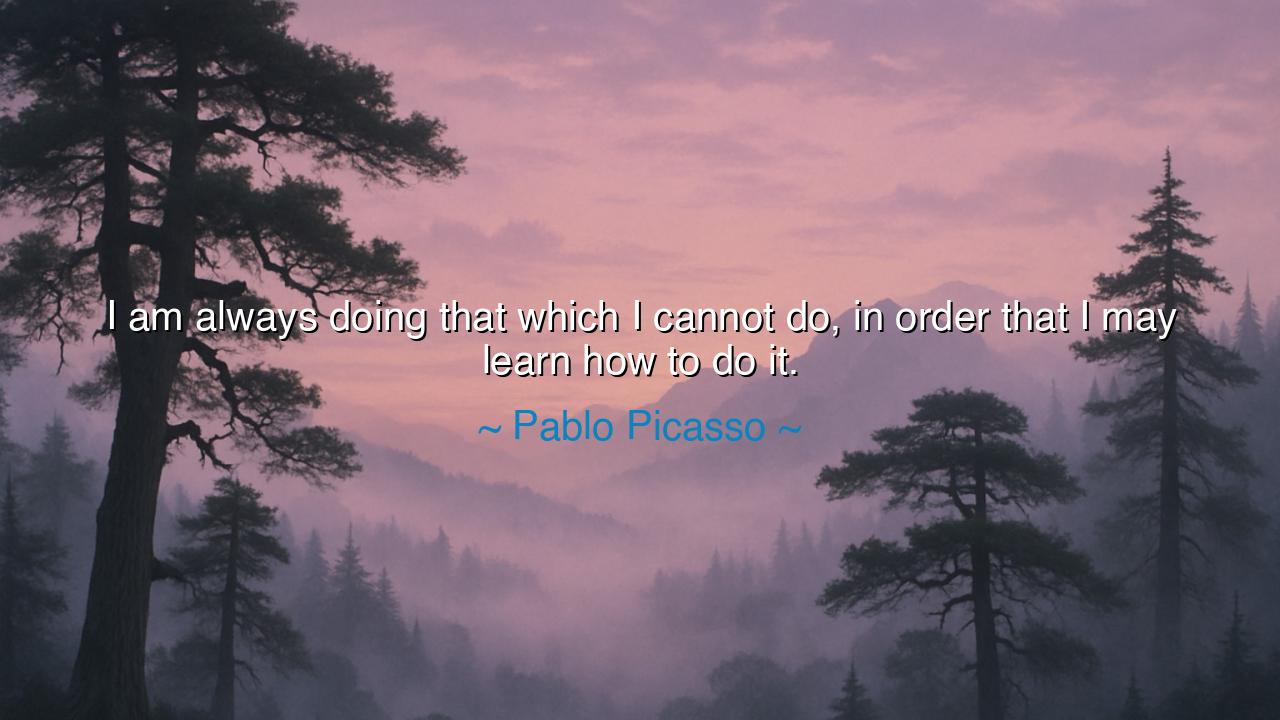
I am always doing that which I cannot do, in order that I may






The immortal Pablo Picasso, a man whose hands reshaped the vision of art itself, once said: “I am always doing that which I cannot do, in order that I may learn how to do it.” In these words lies the spirit of every creator, every pioneer, every soul that dares to step beyond the known into the uncharted. This is not merely a statement about painting—it is a creed for living. For growth begins not in comfort, but in courage; not in mastery, but in the willingness to fail gloriously for the sake of becoming something more. Picasso’s words are a hymn to that eternal flame within the human heart that whispers, “Go further.”
To do that which one cannot do is to face the edge of ability and take a step beyond it. It is to confront the unknown with bare hands and an unbroken spirit. Most people live within the walls of what they already know—they repeat, refine, and preserve. But the visionary, like Picasso, breaks those walls to discover what lies beyond them. He does not fear the impossible, for he knows that what we call “impossible” is only the boundary between what is and what can be. In this daring lies the essence of learning—not the passive receiving of knowledge, but the active creation of it through struggle and discovery.
Throughout his life, Picasso embodied this principle. As a young artist, he mastered classical realism by the age of fourteen, painting with the precision of the old masters. Yet he soon felt imprisoned by perfection. He began to destroy what he knew—to fragment faces, to twist form and color, to paint not as the eye sees, but as the soul feels. His Cubist revolution was born not from certainty, but from the audacity to attempt what he did not yet know how to do. Critics mocked him, calling his work madness, chaos, even mockery of art itself. But Picasso pressed onward. Each failure became a new revelation, each broken rule a doorway into freedom. And from that courage to explore the unknown, he changed forever the language of art.
The ancients, too, spoke this wisdom in their own tongue. The philosopher Aristotle wrote that we become brave by performing brave acts, just as we become just by practicing justice. The doing precedes the knowing; the learning is in the doing. A warrior learns not the art of battle by watching from afar, but by standing in the dust and heat of the field. So too, the craftsman learns not by fearing error, but by embracing it as teacher. The unknown is the forge where skill is born, and the flame of effort is the only fire that tempers the soul into mastery.
Consider also the life of Thomas Edison, who brought light to the world not through immediate success, but through countless failures. When asked how he felt about his thousands of failed experiments, he replied, “I have not failed. I have found ten thousand ways that do not work.” He, like Picasso, understood that every attempt, even the broken ones, moves us closer to understanding. The man who never risks the unknown will never discover the new. The path of innovation, whether in art, science, or life itself, is paved with the courage to act before one fully knows how.
Picasso’s words also carry a deeper message of humility. To “do that which I cannot do” requires admitting that there are still things beyond one’s reach. The proud man, content in his mastery, ceases to learn. The humble man, aware of his limits, expands them endlessly. This humility is the secret of the truly great: they remain students, even at the height of their genius. Picasso, who was already a legend in his lifetime, never ceased to experiment—to sculpt, to design, to explore. His greatness lay not in what he had achieved, but in what he was still willing to attempt.
So let this be your lesson, O seeker of wisdom: do not fear what you cannot do. Step toward it. Struggle with it. Fail, and fail again if you must. For every failure refines your strength, and every attempt draws you closer to mastery. The mountain of skill is climbed not by those who wait for perfect knowledge, but by those who begin with imperfect hands and determined hearts.
Therefore, live as Picasso lived—boldly, curiously, fearlessly. Seek not safety in the known, but transformation in the unknown. Let your work, your craft, your very life be an act of becoming, not of being. And when doubt whispers that you are not ready, remember the artist’s creed: “I am always doing that which I cannot do, in order that I may learn how to do it.” For in that sacred striving lies the true measure of the human spirit—ever reaching, ever creating, ever becoming.






AAdministratorAdministrator
Welcome, honored guests. Please leave a comment, we will respond soon